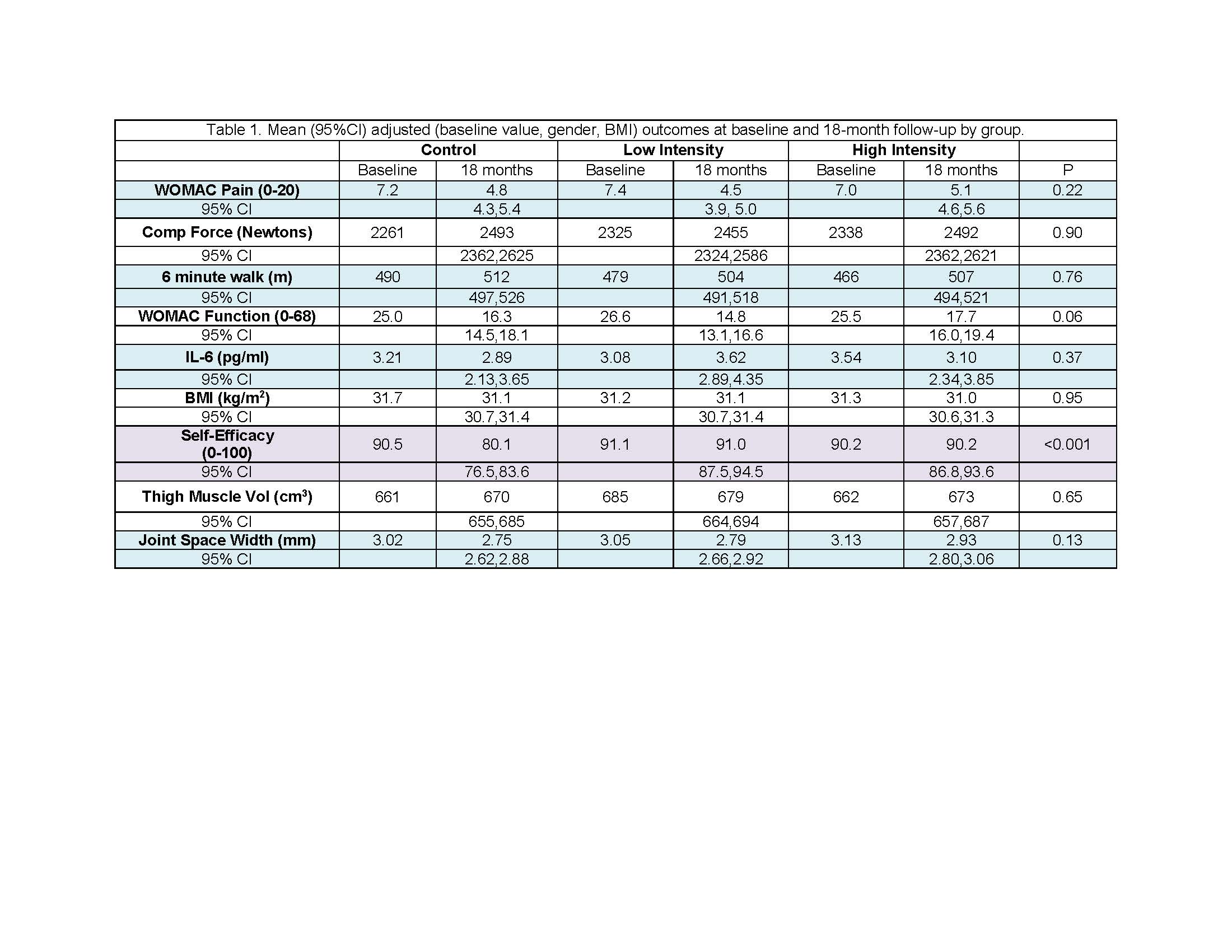Session Information
Session Type: ACR Abstract Session
Session Time: 4:30PM-6:00PM
Background/Purpose: Few have studied long-term high-intensity strength training in knee osteoarthritis (OA) patients due to the unsubstantiated belief that it might exacerbate OA symptoms. Our purpose was to determine whether high-intensity strength training would improve mechanistic and clinical outcomes compared to low-intensity strength training and attention control.
Methods: Single-blind, 18-month, 3-arm randomized clinical trial conducted between September 2011 and August 2017. The strength training interventions were center-based. Participants were 377 community-dwelling adults (age ≥ 55 years) with a body mass index of 20-45 kg/m2 (mean = 31.4 kg/m2) with pain and mild to moderate radiographic knee OA. Randomization was to either high-intensity strength training (75-90% 1RM), low-intensity strength training (30-40% 1RM), or attention control (healthy living classes). Primary outcomes were knee pain and knee-joint compressive forces during walking. Secondary outcomes included additional clinical measures of disease severity (e.g., function, mobility), radiographic progression by joint space narrowing, thigh muscle volume, knee extensor and knee flexor strength, inflammatory biomarkers, and self-efficacy. All primary statistical analyses used an intention-to-treat method.
Results: At 18 months, 320 (85%) participants completed the study. Knee pain and knee compressive forces were similar between the groups. Knee extension and flexion strength were significantly greater in the two strength-training groups (Figures 1 and 2). Self-reported function, 6-minute walk distance, BMI, IL-6, thigh muscle volume, and joint space width were similar across groups. Self-efficacy was greater in the two strength-training groups compared to the control group (Table 1). The two strength-training groups and the attention control group met the OARSI responder criteria of clinically important reductions in pain (between 27-39%) and improvements in function (between 31-44%) with no statistical differences between groups.
Conclusion: The significant improvements in knee strength in the two strength-training groups relative to the control group did not result in significantly better reductions in pain and knee joint loads, or improvements in function. This was due, in part, to the clinically important improvements in pain and function in the control group of between 33-35%. These results indicate that long-term high-intensity strength training for knee OA patients is a well-tolerated non-pharmacologic intervention that increases knee extensor and flexor strength, significantly improves self-efficacy, and does not exacerbate knee pain or disease progression relative to low-intensity strength training or attention control. An attention control with a focus on healthy living and living with OA, however, is just as effective as high- and low-intensity strength training in improving most clinical and mechanistic outcomes.

START ACR 2019 abstract figures
To cite this abstract in AMA style:
Messier S, Mihalko S, Beavers D, Nicklas B, DeVita P, Carr J, Hunter D, Bennell K, Guermazi A, Lyles M, Loeser R. Is Long-term High-intensity Strength Training Beneficial or Harmful for Knee Osteoarthritis Patients? The Strength Training and Arthritis Trial (START) [abstract]. Arthritis Rheumatol. 2019; 71 (suppl 10). https://acrabstracts.org/abstract/is-long-term-high-intensity-strength-training-beneficial-or-harmful-for-knee-osteoarthritis-patients-the-strength-training-and-arthritis-trial-start/. Accessed .« Back to 2019 ACR/ARP Annual Meeting
ACR Meeting Abstracts - https://acrabstracts.org/abstract/is-long-term-high-intensity-strength-training-beneficial-or-harmful-for-knee-osteoarthritis-patients-the-strength-training-and-arthritis-trial-start/

